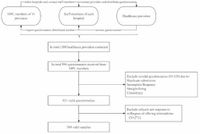The COVID-19 pandemic has significantly accelerated the adoption of telemedicine, which is now seen as a crucial component of healthcare delivery in many parts of the world, including China. A recent study has revealed that a remarkable 92.5% of healthcare professionals in China are willing to continue participating in telemedicine, while 93.5% expressed their readiness to recommend it to patients. Conducted between September and October 2023, this cross-sectional survey engaged 560 healthcare professionals from 230 hospitals across 11 provinces, highlighting the positive outlook on telemedicine services in a post-pandemic context.
Telemedicine's trajectory in China began in the mid-1980s, but its evolution was notably accelerated by a series of government policies aimed at enhancing healthcare access, especially in remote regions. By 2023, telemedicine services had effectively expanded their reach, serving all residents in prefecture-level cities. This development underscores an increasing integration of telemedicine into everyday medical practices. The study's main purpose was to assess healthcare professionals' willingness to engage with telemedicine after the pandemic and identify factors that influence their decisions.
The participants in the study showcased diverse backgrounds, with a mean age of 37.14 years and an average of three years of telemedicine experience. Notably, a majority were female (52.7%) and worked primarily in clinical departments. The encouraging findings reflect the potential for telemedicine to enhance medical accessibility and resource utilization. "Healthcare professionals play a vital role in telemedicine services," the authors of the article noted, emphasizing their connection between patient care and technological resources.
According to the survey results, the willingness to participate in telemedicine is profoundly linked to various factors like perceived usefulness, subjective norms, and overall satisfaction with the services offered. Healthcare professionals who viewed telemedicine as useful were more likely to continue using it. Satisfaction was shown to mediate the relationship between perceived usefulness and willingness to participate, revealing that improving healthcare professionals' experiences is vital for sustained engagement.
The results highlighted that while a significant portion of the professionals expressed a willingness to recommend telemedicine, those with intermediate and senior professional titles showed lower levels of engagement compared to junior titles. This reluctance suggests that more experienced professionals might prefer traditional face-to-face consultations, which rely heavily on personal interactions and physical examinations, thus presenting challenges in the telemedicine framework.
Moreover, the research indicated that healthcare workers with more telemedicine experience tend to have a higher willingness to engage with these services. This finding emphasizes the importance of familiarity and comfort in technology use, as those with extended exposure to telemedicine are more inclined to appreciate its benefits and effectiveness. With the ongoing evolution of healthcare technologies, consistent training and support for healthcare professionals will be instrumental in enhancing telemedicine implementation.
To maximize the acceptance of telemedicine, the study points towards strategic areas for improvement. Increasing healthcare professionals' perceptions of the usefulness of telemedicine, enhancing their satisfaction with the services, and highlighting the influence of social norms may encourage greater participation in these digital health platforms. Research authors suggest that policies be put in place to broaden patient access, as this would, in turn, support healthcare professionals in promoting telemedicine.
The study also outlines that maintaining high satisfaction levels is crucial for the continued endorsement of telemedicine among healthcare professionals. By exploring healthcare workers' engagement and recommendation intentions, the study provides empirical insights into the evolving scope of telemedicine in China. Conclusions drawn emphasize that healthcare professionals are crucial to advancing telemedicine services. As such, their ongoing involvement and positive engagement are essential for leveraging the benefits that telemedicine can offer to the healthcare landscape.
Overall, the findings present a promising future for telemedicine in China's post-pandemic landscape, with significant implications for enhancing healthcare accessibility and efficiency. Continuous improvements in telemedicine practices, supported by adequate training and infrastructure development, will be key to further integrating this service into mainstream healthcare delivery.

